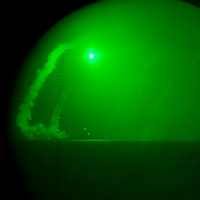The Obama administration's reluctant involvement in the Libya operation recalls the Biblical adage, "One man sows, another reaps." The United States agreed to undertake the heavy lifting needed to get the air campaign started, in particular handling the precision strikes to disable Moammar Gadhafi's air defenses, suppress some of his heavy weapon capabilities and target the very centers of his regime's power in Tripoli. But the understanding was that responsibility would subsequently be transferred onto the shoulders of others: the Libyan rebels, our NATO allies and other partners. In every speech and statement, President Barack Obama was quite clear that the U.S. role would be limited and circumscribed, and that there would be no slippery slope toward an open-ended U.S. commitment of blood and treasure to this mission.
The consensus assessment is that this has not worked out according to plan. The Gadhafi regime did not fold after the first wave of airstrikes. The Libyan opposition to Gadhafi that was assumed to lurk even in the capital Tripoli was not emboldened to come out and topple a dictator, even one targeted by allied bombs. And the rebel groups have not shown much prowess on the battlefield. So now the president is besieged by calls from all quarters to "do more." Obama's opponent in the 2008 presidential race, Sen. John McCain, has urged the president to "re-engage" in Libya, noting that in passing the mission off to NATO, the U.S. is "handing it over to people and countries with limited capabilities and limited assets."
Responding to this criticism, Secretary of State Hillary Clinton reiterated in Berlin that the U.S. will continue to support the NATO operation in Libya until its goals have been achieved. But the question is, on whose timetable? The rebel groups want further military intervention to help them achieve the quick victory that so far has eluded them on the battlefield, while NATO allies want the United States to bring its unique and formidable capabilities back to the table. As a result, it remains to be seen whether the Obama team decides to back away from its earlier insistence that NATO is fully capable of carrying out this mission on its own.

